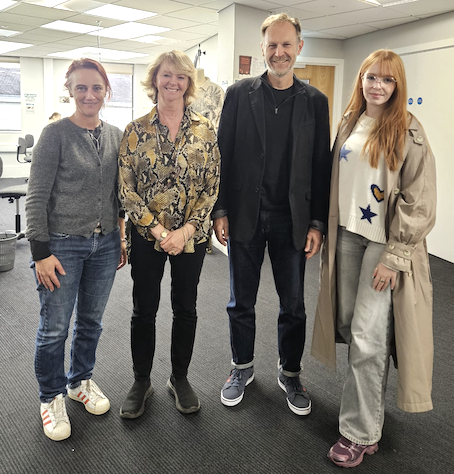On Tuesday, 21st October, the Leicester FTA Fashion Hub welcomed two distinguished guests from Loughborough University: Professor Graham Hitchen and Emily Cox. The visit formed part of an ongoing initiative to better understand the evolving fashion ecosystem, particularly in relation to sustainability, decarbonisation, and digital transformation in UK manufacturing.
- Professor Graham Hitchen serves as Director of the Policy Unit, Policy Director of the CoSTAR Foresight Lab, and Chair of the Digital Decarbonisation Strategic Advisory Group at Loughborough University. With a strong background in policy and creative industries, Graham formerly worked as Director of Creative for the London Development Agency and played a pivotal role in funding initiatives like FashionCapital.co.uk through the London Fashion Forum Programme.
- Emily Cox is currently pursuing a PhD focused on decarbonisation within the fashion industry, based at Loughborough University. Her research aims to uncover how digital innovation can play a transformative role in reducing fashion’s carbon footprint while strengthening UK-based manufacturing.

The meeting was arranged to facilitate a deeper understanding of Leicester’s fashion ecosystem – including the full end-to-end supply chain from fabric sourcing to end-user delivery. Emily and Graham sought insights into how local manufacturers, designers, and training providers are adapting to changes in mechanisation and digitalisation.
The visit involved discussions with Jenny Holloway, CEO of Fashion-Enter Ltd and Divya Kamath, Operational Manager of the Leicester Fashion Hub. The team provided a comprehensive overview of the current landscape, challenges, and opportunities that lie within Leicester’s manufacturing and production community.
Jenny shared a detailed walkthrough of several digital tools currently used at the hub, including:
- Galaxius
- Optitex
- Style3D
- Vetigraph
She discussed the practical applications, benefits, and limitations of each platform, offering real-world insights into how digital solutions are or aren’t impacting workflow and production efficiency.
One key point raised was whether digital transformation in fashion is truly occurring on the ground, or if its potential remains largely untapped.
Jenny recommended that Emily explore how digitalisation could strengthen efforts to bring PPE and garment production contracts back to the UK, specifically to areas like Leicester. She highlighted the need for stability, continuity, and regular orders as essential to sustaining domestic manufacturing.
There was also a broader discussion around aligning Emily’s research outcomes with practical business cases that could benefit the local industry, such as localising supply chains and promoting responsible production practices.
Jenny committed to supporting Emily’s research by connecting her with local factories and manufacturers. The visit marks a positive step in fostering collaboration between academia and industry in tackling some of fashion’s most pressing issues, such as sustainability, localisation, and innovation.
As Divya aptly noted: “It’s great to support the university in this much-needed area of development.”